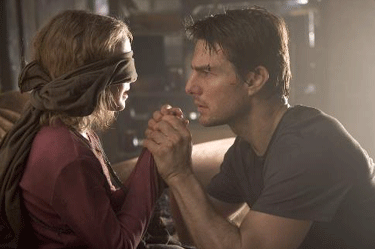
 |
War of the WorldsSpecial Effects Can’t Trump Emotional Manipulation |
Title: War of the Worlds
Director: Stephen Spielberg
Starring: Tom Cruise, Dakota Fanning, Tim Robbins
Released: June 29, 2005
Running Time: 1 hour, 56 minutes
MPAA Rating: PG-13 for frightening sequences of sci-fi violence and disturbing images
Freak Nation Rating: ![]()
![]()
![]()
![]()
Stephen Spielberg has two major “modes”: sometimes, he creates deep, satisfying works like Schindler’s List or Amistad, full of thought-provoking ponderings on themes of timeless importance. Other times, however, he just goes straight for blatant emotional manipulation. War of the Worlds, being a standard summer blockbuster, comes from the latter side of Spielberg’s artistic palette.
The basic storyline, of course, is over a century old, and hence completely spoiler-proof: aliens invade the Earth, all our technology is powerless to stop them, and people die by the thousands (if not millions). Finally, when Earth’s defeat is inevitable, the aliens all die, having no immunity to terrestrial diseases like the common cold.
In Spielberg’s hands, this becomes a tour-de-force of special effects, all of which are very good. Bizarre lightning storms, alien machines erupting from beneath the ground, death rays that evaporate people and slice through buildings, metal tentacles tipped with electric eyes that search through buildings for hiding humans, and even the aliens themselves, are all realized with care and precision. The aliens, in particular, are very alien; I haven’t seen a design quite like that before, and the way they move is both realistic and completely unfamiliar.
 Ray Farrier (Tom Cruise) tries to keep his daughter Rachel (Dakota Fanning) from seeing too much of Earth’s devastation. |
The actors also give good performances; Dakota Fanning in particular, cast as Tom Cruise’s daughter, manages to show a good deal of childlike innocence without ever seeming stupid, overly naïve, or gratuitously cute. Cruise himself, despite his strange off-screen beliefs, is still a versatile and decent actor, and moves easily from “cocky working-class guy” to “father unready to deal with kids” to “man whose planet is being invaded and is now hysterical and trying to cope”.
But all the performances and special effects in the world can’t save the movie from the screenplay’s various gaps in logic, or from Spielberg’s heavy-handed attempts at emotional manipulation. Screenwriters Josh Friedman and David Koepp have wisely removed the specific Martian origin of the invaders; while that seemed quite plausible in 1898, it’s now ridiculous. Instead, the aliens’ home planet is never specified, but their invasion plan is now nearly as ludicrous as a Martian origin would have been, involving a completely unexplained delay of a million years or more.
It’s also not quite clear why the aliens invaded. Granted, it was never specified in Wells’ original, either — there was simply the assumption that Earth is a much more hospitable place for life. But in this movie, there is a strong implication that they came for our water (or possibly for our blood). If the water was what they were after, they could have gotten all they could ever need from any solar system’s Oort cloud; if this species feeds on others’ blood, you’d think a planet that was inhabited only by unintelligent creatures would be an easier target. (This, of course, is on top of the extreme unlikelihood of creatures from another star system finding our body chemistry at all palatable.)
Next to major holes like that, little details like a camcorder that still works after everything else has been disabled by repeated electromagnetic pulses is mere quibbling. Less trivial, however, is the bizarre alien death ray that instantly vaporizes humans, and slices through buildings like the hot butter-knife of God, yet leaves clothing miraculously untouched. Sure, it makes for the chilling image of people being blasted to dust and their clothing blowing away in the breeze, but it also makes willing suspension of disbelief nearly impossible. I’m willing to grant that the aliens have technology we can’t understand. But making it gratuitously ignore what we already know of reality is going too far, especially when it seems to have been done partly to play cheaply on memories of 9/11.
Finally, at the risk of a spoiler, the movie ends with the suddden resurrection of a character who really should, by all rights, have been dead. Sure, we never saw the body. But while characters turning up after a “nobody could have survived that!” incident is a major staple of comic books, this movie isn’t from that genre. What was obviously intended as an emotional, feel-good moment instead left me and others in my party saying “I disbelieve. Can I make my saving throw against cheap tear-jerking plot-cheese?”
And that kind of overly-transparent emotional manipulation isn’t limited to the ending, either. When the heroes are hiding in a basement and a robotic alien probe-tentacle comes gliding down the stairs to search for them, Spielberg eventually goes so far in raising the tension level that the audience becomes painfully aware that they’re being played with. Which makes them annoyed. And bored.
But worst of all are the ongoing and transparent attempts to milk 9/11 for visual and emotional echoes. When Tom Cruise’s character returns to his house after his first encounter with the alien death machines, he’s covered with the dust of vaporized fellow-humans — reminiscent of the asbestos and other dusts that covered downtown Manhattan after the collapse of the World Trade Center. This, in a scene set in a suburb of New York, right after the introduction of the miraculous clothing-sparing disintegration ray that left the air clouded with wind-blown clothing that echoes the blowing debris from the towers’ destruction.
For those who missed that heavy-handed parallel, Cruise’s children ask, minutes later, whether “the terrorists” are responsible for the devastation. The idea of this parallel is chilling, suggesting that terrorists are alien, incomprehensible, and inhuman. Furthermore, there is no room in this movie for any grief or remembrance of the characters killed in the attack, which cheapens the memories of all those who died on September 11th.
I’m not trying to say that drawing parallels with 9/11 is illegitmate. But if you’re going to make such parallels, you should treat them with respect, and you should especially treat the dead with respect. Spielberg doesn't do that in War of the Worlds; instead, the dead are merely grist for his heartstring-pulling mill.
Kai MacTane, the webmaster of Freak Nation, was born in New York, but left it when he was five years old and has been back only for a few brief visits since. If he were invading a planet in another star system, he sure as hell wouldn’t do it the way these aliens did.